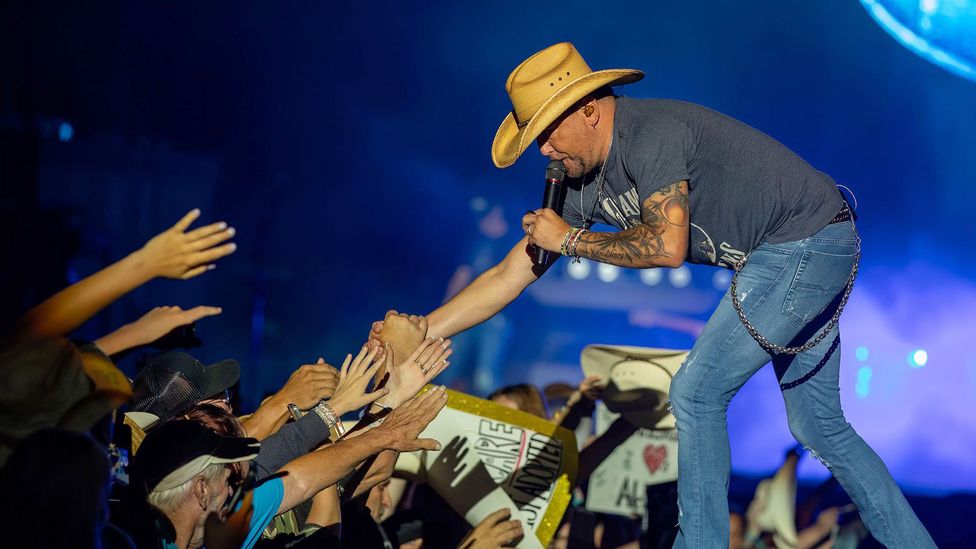In the culture wars that continue to divide US politics, the right wing may have found its latest hero in Oliver Anthony, whether he likes it or not. Last week, Anthony’s song Rich Men North of Richmond, which criticises Washington and big government, dropped on a West Virginia radio station’s YouTube channel and the unknown singer-songwriter became a viral sensation with more than two million views over two days and more than 20 million so far. In the roughly produced video, Anthony, a burly guy with a big red beard and a guitar, stands in a wooded area, looking and sounding like an everyday blue-collar worker. “I’ve been sellin’ my soul, workin’ all day/ Overtime hours for bullshit pay,” he sings. “It’s a damn shame what the world’s gotten to/ For people like me and people like you.”
More like this:
– Can a parody song top the charts?
– The film that has divided the US
– The erotic drama too hot for the US censors
It wasn’t just the working-class “you” he was addressing who paid attention though. Within days, right-wing politicians were championing the song, which neatly fits some conservative narratives, such as government overtaxing. Among others, Congresswoman Marjorie Taylor Greene called the song “the anthem of the forgotten Americans”. Kari Lake, the Trump-backed Republican who ran for governor of Arizona, said it was “the anthem of this moment in American history”. NBC News picked up the story on its website and called it a “conservative anthem”. On the left, Connecticut Democrat Senator Chris Murphy posted that “progressives should listen to this”, and that the issues Anthony was highlighting were “all problems the left has better solutions to than the right”. Media attention for the song mushroomed.
Whatever the genuine musical appeal of Anthony’s song, it broke into the news and the culture in part because of its strong political message. However, in a video posted the day before Rich Men dropped, Anthony said: “I sit pretty dead centre on politics”. Since the viral success of his track, he has not been giving interviews and did not respond to a request from BBC Culture for comment.
Rich Men North of Richmond is the latest in a series of controversial cultural flashpoints that highlight the ties between pop culture and the strongly divided US political landscape. Other recent examples include Jason Aldean’s country hit Try that in a Small Town, with a video that had images of violence and Black Lives Matter protests, and lyrics that suggest “good old boy” Americans can maintain law themselves. The music critic Jon Caramanica characterised the song on his New York Times podcast as “dog-whistle stuff, red meat for the [conservative] base”. However Aldean denied that the song had anything to do with race and was instead a celebration of small-town values, calling out the criticism as “not only meritless, but dangerous”.
The recently-released film Sound of Freedom has also become an unlikely US hit, with some critics taking its anti-child-trafficking story at its word, while others suggested it echoed the unfounded QAnon conspiracy theory about liberals condoning sex crimes against children. Alejandro Monteverde, the director of Sound of Freedom, has given interviews saying how heartbroken he is at the false QAnon label.
Boosting sales
Oliver Anthony’s Rich Men North of Richmond represents the image of the rural, put-upon white working-class hero, and the song reflects the narrative of grievance espoused by some right-wing politicians. His lyrics describe: “the obese milkin’ welfare” as well as saying: “I wish politicians would look out for miners/ And not just minors on an island somewhere”, which some have suggested is a reference to the convicted sex offender Jeffrey Epstein. In another part of his introductory video, Anthony says the issue of child abuse made him decide to speak out, “when I started to see that becoming normalised.” Similarly, when the Aldean video caused a backlash, his wife, Brittany Aldean, defended him on Instagram, and asked, “How about instead of creating stories why not focus on the real ones, such as child trafficking?” The idea that child abuse has been ignored or “normalised” again echoes the common but unevidenced conspiratorial QAnon narrative, as some critics have pointed out.
The controversial video for Jason Aldean’s hit Try that in a Small Town was pulled from Country Music Television (Credit: Alamy)
The Try That in a Small Town video was pulled from Country Music Television, and the six seconds of Black Lives Matter images have since been removed, which Aldean’s record label said was due to copyright issues. But the controversy helped boost sales. After the backlash to the video, which dropped two months after the song itself, demand jumped by 999%, according to The Hollywood Reporter.
And this latest controversy could change everything for Anthony, whose earlier, little-known songs are about drinking and working. In the personal video he says he has found sobriety and religion. If and when he addresses politics, we may know more. At the moment, his song could become just one more weapon in the culture wars.
If you liked this story, sign up for the weekly bbc.com features newsletter, called The Essential List. A handpicked selection of stories from BBC Future, Culture, Worklife and Travel, delivered to your inbox every Friday.
If you would like to comment on this story or anything else you have seen on BBC Culture, head over to our Facebook page or message us on Twitter.
